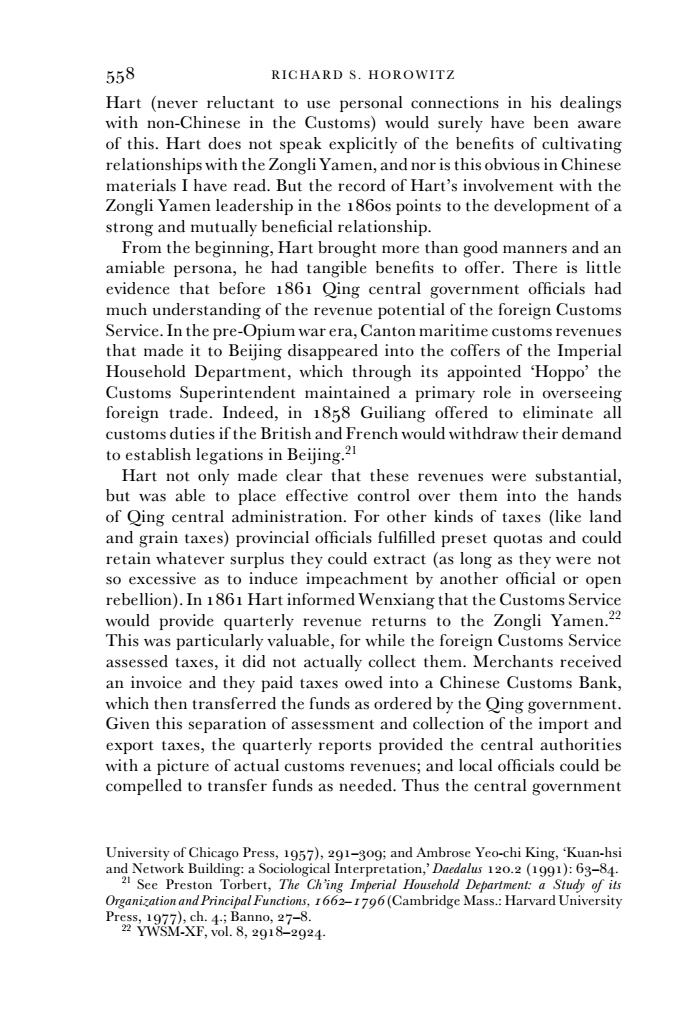正在加载图片...

558 RICHARD S.HOROWITZ Hart (never reluctant to use personal connections in his dealings with non-Chinese in the Customs)would surely have been aware of this.Hart does not speak explicitly of the benefits of cultivating relationships with the Zongli Yamen,and nor is this obvious in Chinese materials I have read.But the record of Hart's involvement with the Zongli Yamen leadership in the 186os points to the development of a strong and mutually beneficial relationship. From the beginning,Hart brought more than good manners and an amiable persona,he had tangible benefits to offer.There is little evidence that before 1861 Qing central government officials had much understanding of the revenue potential of the foreign Customs Service.In the pre-Opium war era,Canton maritime customs revenues that made it to Beijing disappeared into the coffers of the Imperial Household Department,which through its appointed Hoppo'the Customs Superintendent maintained a primary role in overseeing foreign trade.Indeed,in 1858 Guiliang offered to eliminate all customs duties if the British and French would withdraw their demand to establish legations in Beijing.21 Hart not only made clear that these revenues were substantial, but was able to place effective control over them into the hands of Qing central administration.For other kinds of taxes (like land and grain taxes)provincial officials fulfilled preset quotas and could retain whatever surplus they could extract (as long as they were not so excessive as to induce impeachment by another official or open rebellion).In 1861 Hart informed Wenxiang that the Customs Service would provide quarterly revenue returns to the Zongli Yamen.22 This was particularly valuable,for while the foreign Customs Service assessed taxes,it did not actually collect them.Merchants received an invoice and they paid taxes owed into a Chinese Customs Bank, which then transferred the funds as ordered by the Qing government. Given this separation of assessment and collection of the import and export taxes,the quarterly reports provided the central authorities with a picture of actual customs revenues;and local officials could be compelled to transfer funds as needed.Thus the central government University of Chicago Press,1957),291-309;and Ambrose Yeo-chi King,Kuan-hsi and Network Building:a Sociological Interpretation,'Daedalus 120.2(1991):63-84. 21 See Preston Torbert,The Ch'ing Imperial Household Department:a Study of its Organization and Principal Functions,1662-1796(Cambridge Mass.:Harvard University Press,1977),ch.4.;Banno,27-8. 22YSM-XF,vol.8,2918-2924558 RICHARD S. HOROWITZ Hart (never reluctant to use personal connections in his dealings with non-Chinese in the Customs) would surely have been aware of this. Hart does not speak explicitly of the benefits of cultivating relationships with the Zongli Yamen, and nor is this obvious in Chinese materials I have read. But the record of Hart’s involvement with the Zongli Yamen leadership in the 1860s points to the development of a strong and mutually beneficial relationship. From the beginning, Hart brought more than good manners and an amiable persona, he had tangible benefits to offer. There is little evidence that before 1861 Qing central government officials had much understanding of the revenue potential of the foreign Customs Service. In the pre-Opium war era, Canton maritime customs revenues that made it to Beijing disappeared into the coffers of the Imperial Household Department, which through its appointed ‘Hoppo’ the Customs Superintendent maintained a primary role in overseeing foreign trade. Indeed, in 1858 Guiliang offered to eliminate all customs duties if the British and French would withdraw their demand to establish legations in Beijing.21 Hart not only made clear that these revenues were substantial, but was able to place effective control over them into the hands of Qing central administration. For other kinds of taxes (like land and grain taxes) provincial officials fulfilled preset quotas and could retain whatever surplus they could extract (as long as they were not so excessive as to induce impeachment by another official or open rebellion). In 1861 Hart informed Wenxiang that the Customs Service would provide quarterly revenue returns to the Zongli Yamen.22 This was particularly valuable, for while the foreign Customs Service assessed taxes, it did not actually collect them. Merchants received an invoice and they paid taxes owed into a Chinese Customs Bank, which then transferred the funds as ordered by the Qing government. Given this separation of assessment and collection of the import and export taxes, the quarterly reports provided the central authorities with a picture of actual customs revenues; and local officials could be compelled to transfer funds as needed. Thus the central government University of Chicago Press, 1957), 291–309; and Ambrose Yeo-chi King, ‘Kuan-hsi and Network Building: a Sociological Interpretation,’ Daedalus 120.2 (1991): 63–84. 21 See Preston Torbert, The Ch’ing Imperial Household Department: a Study of its Organization and Principal Functions, 1662–1796 (Cambridge Mass.: Harvard University Press, 1977), ch. 4.; Banno, 27–8. 22 YWSM-XF, vol. 8, 2918–2924